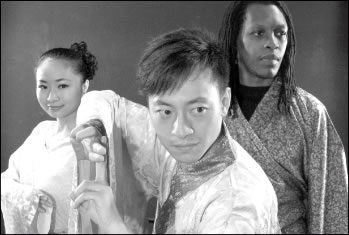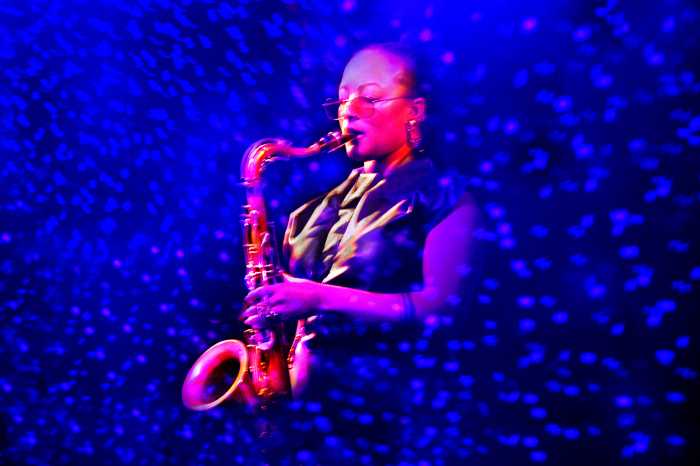By JERRY TALLMER
Multiculti cast gives cautionary tale its kick (and punch)
Just the names of the 26 characters are enough to set you dreaming…or smiling. Here are a few:
“The Good People” are:
Master Lin, owner of Peerless Swords to Hire.
Mistress Lin, his wife.
Master Autonomy.
Gracious Jade, a beautiful young nun.
Little Fox, apprentice swordsman and somewhat battered hero.
“The Bad People” are:
Dong Fang The Undefeated.
Little Smokey.
Master Liberty.
Master Quest.
Tian Of No Clan, a bandit.
Of course, the Good People are not always so good — they tend toward hypocrisy and browbeating — while the Bad People are not always so bad; in particular Tian the bandit. He’s a plague-on-both-your-houses type who — in the midst of a sword vs. saber duel with our boy Little Fox — pauses, laughs, and exclaims:
“Of all the opponents I have had all these years, you, Little Fox, have to be the smartest and quickest. But you have a long way to go to catch up with me. And you are dreaming of winning in this little bit of time? There’s simply no such thing.”
It is, shall we say, the beginning of a beautiful friendship — almost as beautiful as Little Fox’s hopeless love for the virginal, unattainable Gracious Jade.
The 18 actors/dancers/singers/Martial Arts simulators who fulfill the 26 speaking roles of “Laughing in the Wind” (under Joanna Chan’s direction) are an ethnically mixed lot — Asian, African-American, Caucasian; from Hong Kong, Taiwan, mainland China, the United States. They use four different languages, including Mandarin and Cantonese Chinese. Projections throw the Chinese/English translations on a scenery flat.
A sampling of the melting pot cast:
Sen Yang, a young professional actor from Manchuria, plays Little Fox.
Carl Ka-Ho Li, who came to the United States when very young, plays Tian the bandit.
Stephanie Willing, a young Caucasian actress/dancer from Texas, is Gracious Jade, the lovely nun.
Wayne Chang, originally from Hong Kong, plays the blowhard Master Autonomy.
And chief villain Dong Fang the Undefeated — who turns out to be not quite so villainous — is rendered by a young black woman named Ajia Maximillian.
“I am not a martial arts fan,” says the Ms. Chan — who has long also been the New York Chinatown community’s Maryknoll nun Sister Joanna. “I had never read any of the martial arts books” — or, by inference, seen any of the endless tide of Wuxia movies.
“But then, in 1997, when Hong Kong” — where she herself had been born and raised — “was very worried about having to go back to China, somebody told me to look into Mr. Jin Yong’s ‘Xiao Ao Jiang Hu’ ”— probably the best-selling martial arts novel of all time, source of at least three of those movies and a 40-episode television series called “Laughing In the Wind.”
Yes, she had known — “of course” — about Jin Yong, the pen name of Louis Cha, publisher of the Ming Pao Daily of Hong Kong, in which that 1967 novel had originally been serialized (as well as in 21 other newspapers in almost as many languages).
It was a saga of seven warring mountaintop martial arts schools, each seeking to become supreme throughout the kingdom by virtue of a secret, elusive, oft-disappearing manual of the craft.
“They’re all running after it like the Holy Grail,” says Joanna Chan. “Mr. Jin Yong, who is still alive, insists to this day that his book was not written as a political allegory but just as the perennial story of the human condition.
“When he wrote it, in the 1960s, China was engulfed in Mao Tse-Tung’s 10-year Great Cultural Revolution. By the late 1980s, when I was looking for a new project, Mao was gone and China’s ‘Paramount Leader,’ Deng Xiaoping, proposed to solve the Hong Kong problem through a policy of ‘One Country, Two Systems.’ People were very nervous, and I” — the daughter of a China specialist for the U.S. Defense Department — “was there.
“I ended up writing [for a stage piece] a parable of One School, Five Systems. It had nothing to do with China — but you understand the connection?
This work premiered — directed by her — at the1989 Hong Kong International Arts Festival, “and Mr. Jin Yong came to opening night. Today, for me to restage ‘Laughing in the Wind’ in New York, twelve years after the return of Hong Kong to China, with things by and large having been peaceful — well, the original intent is no longer there.”
But her adaptation, her script, was ready at hand.
“I arrived in this country forty years ago as a young nun assigned to work with the Maryknoll fathers at the Church of the Transfiguration on Mott Street. It’s still there — school and parish — landmarked now, and I still hold rehearsals in the same beautiful, spacious; silent auditorium.
“I’ve done some thirty productions over the years,” says Joanna Chan, artistic director of the Yangtze Repertory Theatre she founded in 1992 “with one simple purpose — to produce work by and for Asian artists. Did an original just last year. So now” — with “Laughing in the Wind” so immediately available — “I felt: Oh, I should give myself a break.”
Those artists — those professionals of today — rarely address her as Sister Joanna. “They don’t know what that’s all about. To them, I’m just Joanna Chan.”
Okay, Sister, if you say so. Little Fox and Tian of No Clan will love you all the more.




































